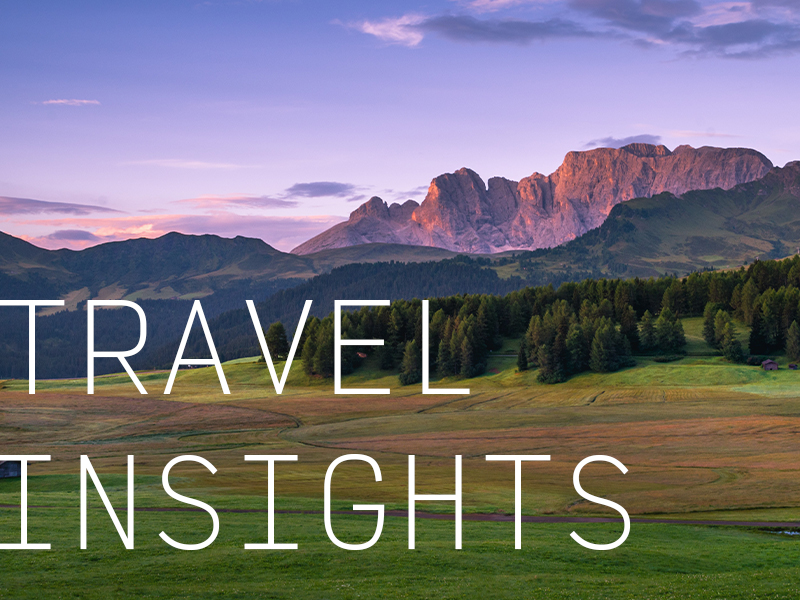Travel Insights: Future Travel
Travel & Tourism

As the world around us continues to change and we head into the second quarter of another year, the travel industry is on the cusp of a renaissance after two years of the pandemic. The next generation of travelers bring a fresh perspective on personalized cravings while innovative travel technology and loyalty programs bring the industry into the future. Aligning with the shifts in culture, travelers will continue to think of the future outcomes of their decisions whether it be through sustainable travel or prioritizing a more holistic sense of wellness. This month’s travel insights provide a glimpse into the early signs of travel’s future.
1. Next Generation of Travelers
The future of travel lies in the hands of the youngest generations. Gen Z is helping lead the return of travel, as many gain inspiration through their beloved social platform, TikTok. Niche tourism, personalization, and flexible payment models are of high value to this group. As Gen Z plans their own trips, it is critical for travel brands to keep a pulse on this audience’s preferences to earn affinity for today and greater expenditures in the long run.
a. Millennial, Gen Z, and younger cohorts make up more than half of the U.S. population and are among those leading the air travel recovery with younger travelers accounting for 166 million Americans.- Skift
b. Gen Z is seeking out the latest trends on their favorite social media app, TikTok. Travel hack videos are going viral with hashtag #travelhacks racking up an overwhelming 731.5 million views and searches for “travel hack flights” up 200% during the last 12 months. – Travel Pulse
c. 27% of Gen Z respondents and 26% of Millennials reported that having products/services tailored to their needs always influences their product / service choice -three percentage points higher than the average for all audiences. – Global Data
Implications: Travel brands will need to meet the expectations of younger generations who consider customization and personalization to be norms. Consider developing niche tourism experiences that focus on fulfilling a specific need and make planning and purchasing easy. TikTok is proving to be an excellent platform for doing just that. A recent ad for Wyoming Office of Tourism asking would-be travelers “Who will you be” ranked as a Top Ad in the United States for consumer engagement.
2. Travel Tech
The pandemic has accelerated travel innovations, with technology being a key aspect of the industry’s future. A third of Americans are eager to adopt new travel technology and are looking for more solutions that allow them to plan and book their trips with ease. When they are unable to travel, innovations in the virtual space allow travelers to have a taste of a trip and connect with other cultures around the world.
a. 57% of travelers wish for a single all-inclusive app for their travel planning and booking needs. – Headout
b. Travel booking app, Hopper, has added a tool belt of fintech products—the ability to freeze flight and hotel prices, the power to cancel tickets for any reason, price drop guarantees that automatically credit customers if rates drop—that now represent 50% of the company’s total revenue. Overall, Hopper’s monthly revenues are now 375% higher than its pre-pandemic high point. – Fast Company
c. Japanese airline group ANA Holdings and JP Games launched the Sky Whale digital platform that hosts multiple digital worlds where consumers can travel between and shop in with friends and family, supporting an interactive, cultural travel experience. – Wunderman Thompson
Implications: While travelers report they find happiness in planning travel, when it comes to aggregating all the individual experiences and suppliers, it’s still a cumbersome and sometimes frustrating process. Look for ways to alleviate pain points from the process and add some fun along the way. Providing travelers with a sneak peak of what’s to come using virtual tech can extend engagement in the planning process and net new revenue.
3. New Loyalty Programs
Travelers continue to prioritize ways to maximize their value when taking trips. Many travel brands are evolving their loyalty offerings to meet their audience’s needs with a focus on subscriptions, personalization, and better pricing. Refreshed loyalty programs are an investment for travel brands to increase customer acquisitions and generate repeat interactions.
a. Airlines are offering subscription plans to garner increased loyalty such as JetBlue’s All-You-Can-Jet Pass sweepstakes and American’s AirPass that offers fixed-rate fares, VIP access and more for $10,000 per person, per year. – Pymnts.com
b. 49% of subscribers say they subscribe to brands directly because they offer better pricing. 46% subscribe to brands directly for better customer service and for better access to product-specific discounts and coupons. -Pymnts.com
c. In 2022, loyalty programs will play an increasingly important role as travelers make decisions about where to go.
- 40% of travelers intend to use loyalty points for trips this year.
- 140% more travelers joined Expedia Rewards in December 2021 vs. December 2019. – Expedia Group Travel Recovery Trend Report
Implications: While loyalty programs can be costly and labor intensive for travel brands to start and manage, marketers should view them as a worthwhile customer acquisition investment that generates repeat bookings. Destinations can find inspiration from Visit Nebraska’s passport program which rewards visitors with branded gear for checking off multiple points within the program.
4. Future-Conscious Travelers
People are taking into account future consequences when considering lifestyle choices such as traveling. Many are prioritizing trip destinations, transportation routes, and pricing structures that allow them to limit their negative impact on the environment while still enjoying the priceless memories today.
a. “Sustainable tourism” is up 178% in global Facebook searches YoY. – Facebook IQ
b. The International Transport Forum predicts that CO2 emissions from the sector will increase by 16% by 2050, versus 2015 levels. – Wunderman Thompson
c. 71% of adult Americans were willing to pay more to lower their carbon footprint while on vacation. – thevacationer.com
Implications: With gas prices soaring, eco-conscious travelers have an accelerated desire to mitigate their use of fossil fuels. Eco-friendly routing, sustainable itineraries and alternate forms of transportation should feature prominently into summer content marketing strategies. Make it easy for travelers to tick-off all the ways in which their trip is helping to regenerate the destinations they visit.
5. Reimagined Destinations & DMOs
Looking into the future of the travel industry, travel brands will reimagine their offerings and destinations will expand the stakeholders who are involved in their development. Destination Marketing Organizations will have an expanded set of responsibilities, including partnering with locals for tourism plans.
a. Destination marketers need to tackle tourism engagement and education among residents as part of their new responsibility.
- Less than half of U.S. and Canada residents feel they are consulted when it comes to how tourism is developed and managed. – Skift
b. The Caribbean Tourism Organization recently announced its plans to work with Planeterra to scale up communities’ integration into the tourism chain by providing training and support needed for them to begin offering their experiences. – Skift
c. “Destinations of all sizes are more competitive in the global visitor economy when government, community and industry priorities are aligned as much as possible.” – DestinationNEXT Futures Study
Implications: Destination organizations should consider fielding resident sentiment studies to gain a better understanding for the perceived impacts of tourism on the local community. Consider adding open-ended questions to quantitative studies, field qualitative focus groups or host roundtables to engage in dialogue around what types of tourism products and experiences are aligned with the communities’ values and vision for the future. Consider feedback loops or avenues for on-going dialogue so that residents feel heard.
